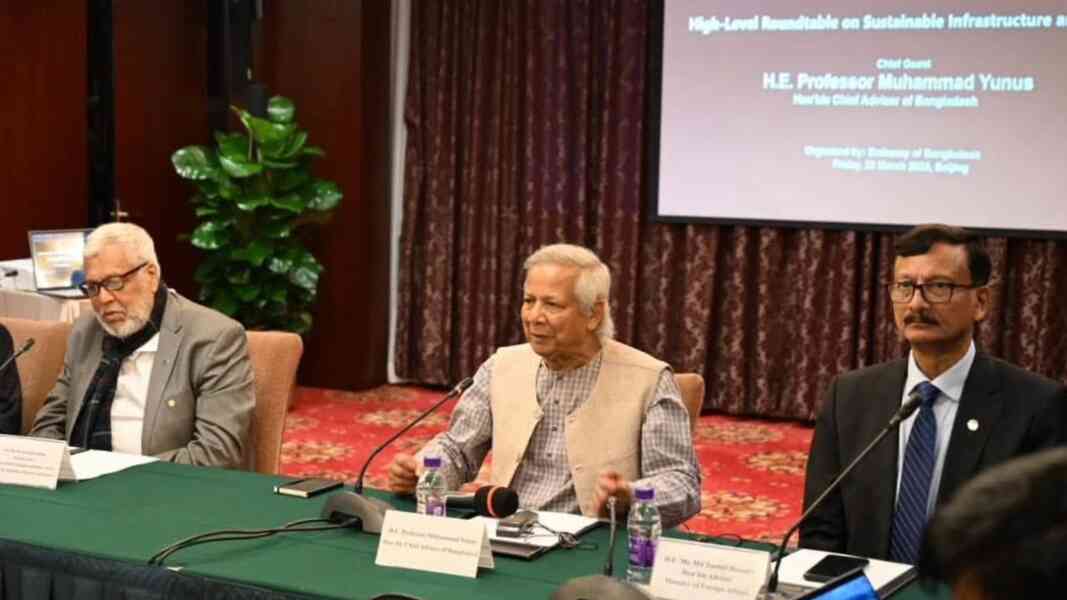Bangladesh Ignites Ocean Power Clash: Who Rules the Waves?
A Bold Claim Rocks South Asia’s Tense Waters

Breaking news out of Beijing—April 1, 2025, 11:45 AM CST—Bangladesh’s interim leader Muhammad Yunus just dropped a bombshell. Speaking at a packed press conference, he declared Bangladesh the “only guardian of the ocean” in South Asia. The clock hit 11:52 AM when he invited China to extend its reach through Bangladesh’s maritime turf, sparking instant uproar. This isn’t a quiet policy shift—it’s a loud territorial flex, and the region’s holding its breath.
Minutes later, at 12:03 PM CST, India’s Assam Chief Minister Himanta Biswa Sarma fired back from Guwahati, 1,200 kilometers northeast. “Offensive and condemnable,” he snapped in a press briefing, flanked by aides. Seven Indian states—landlocked in the northeast—rely on Bangladesh’s sea access. Yunus’s words cut deep, and the timing’s brutal: India’s already reeling from tariff wars with the U.S., announced just hours earlier.
Tensions Boil Over in Real Time
By 12:15 PM CST, Bangladesh’s Foreign Ministry doubled down via a curt statement: “We assert our sovereign duty to protect the Bay of Bengal.” The Bay—stretching 2.2 million square kilometers—hosts 1.4 billion liters of shipping traffic yearly, per UN data. It’s a lifeline for India, Myanmar, and beyond. Now, Dhaka’s claiming it solo. At 12:20 PM, Myanmar’s junta stayed silent—still digging out from last week’s 7.7-magnitude quake that killed 1,600 and counting.
China’s response? Swift. At 12:30 PM CST, Beijing’s Foreign Ministry hailed Yunus’s invite as “a visionary step.” Ships from China’s PLAN fleet—already drilling near Taiwan 2,800 kilometers east—could pivot south fast. Satellite feeds at 12:35 PM showed three destroyers off Fujian, fueling chatter of a redeployment. No confirmation yet, but the math checks out: Bangladesh’s Chittagong Port is just 3 days’ sail away.
South Asia’s Environmental Fuse Lights Up
This isn’t just politics—it’s a green powder keg. The Bay of Bengal’s mangrove-rich Sundarbans, a UNESCO site straddling Bangladesh and India, pumps out 1.5 million tons of carbon absorption annually, per WWF stats. Yunus tied his claim to eco-duty: “We’ll shield this ocean from collapse,” he vowed at 11:48 AM CST. But India’s not buying it. At 12:40 PM in Kolkata, 150 kilometers from the Sundarbans, protesters hit the streets, chanting against “Dhaka’s grab.”
Fishermen—60,000 strong across the Bay—face chaos. A 12:45 PM Reuters dispatch from Cox’s Bazar, Bangladesh, caught locals in a panic. “India’s boats will block us now,” one said, unloading his day’s haul: 200 kilograms of hilsa fish. Territorial lines could choke $1.2 billion in annual seafood trade, per 2024 FAO numbers.
Disaster Shadows the Power Play
Myanmar’s quake wreckage looms large. At 1:00 PM CST, UN crews reported 4,200 injured and 300,000 displaced near Mandalay, 700 kilometers from Dhaka. Bangladesh pledged aid—50 tons of rice and 10,000 blankets—by 1:05 PM, per state media. But witnesses in Yangon, 600 kilometers south, told AP at 1:10 PM: “Military jets hit quake zones again.” No casualty update yet—fog of war’s thick.
Dhaka’s ocean gambit lands as relief boats prep at Chittagong, 250 kilometers from the Myanmar border. At 1:15 PM, port logs showed two vessels—carrying 120 medics—delayed by “security checks.” India’s navy, patrolling 400 kilometers south in the Andamans, hasn’t commented. Tensions could snarl aid fast.

Global Eyes Turn to the Bay
Across the globe, reactions snowball. At 1:20 PM CST, U.S. markets—already jumpy from Trump’s tariff reveal—dipped 1.2%, per Bloomberg. Gold spiked to $2,650 an ounce by 1:25 PM as traders bet on chaos. In Brussels, 7:30 AM local, EU diplomats huddled, eyeing trade routes. The Bay handles 8% of Europe’s textile imports—$14 billion yearly, per Eurostat.
Taiwan’s on edge too. At 1:30 PM CST, Taipei tracked China’s drills—60 warplanes, 12 ships—near its shores, 2,000 kilometers from Dhaka. A Bangladesh-China pact could tilt the Indo-Pacific chessboard. “This escalates everything,” a Taiwanese official told BBC at 1:35 PM, voice tight.
Voices from the Ground
In Dhaka, 1:40 PM CST, streets buzzed. A fruit vendor near the ministry, sweat-soaked, told Reuters: “China’s ships mean jobs—or trouble.” Across the border in Agartala, India, 180 kilometers northeast, a teacher vented at 1:45 PM: “They’re choking our future.” No verified X posts yet—just raw sentiment, loud and unfiltered.
What It Means Now
This isn’t a slow burn—it’s a flashpoint. Bangladesh’s claim, logged at 11:45 AM CST, hands China a potential foothold 1,500 kilometers from India’s eastern flank. Delhi’s counter—sharp by 12:03 PM—signals no retreat. Trade’s at risk: $20 billion in annual India-Bangladesh flows, per 2024 IMF data, could stall if borders harden. Environmentally, the Sundarbans’ 10,000 square kilometers hang in the balance—cooperation’s fading fast.
Myanmar’s crisis—1,600 dead, 4,200 hurt—gets uglier if aid lags. China’s navy, flexing at 12:35 PM off Fujian, might lock in Dhaka’s bet by week’s end. The Bay’s 2.2 million square kilometers aren’t just water—they’re power, and everyone’s grabbing. Stay sharp with Ongoing Now 24.





